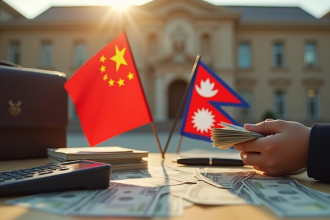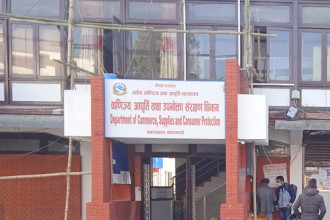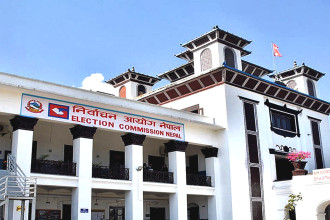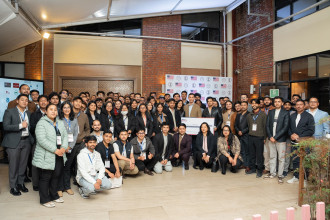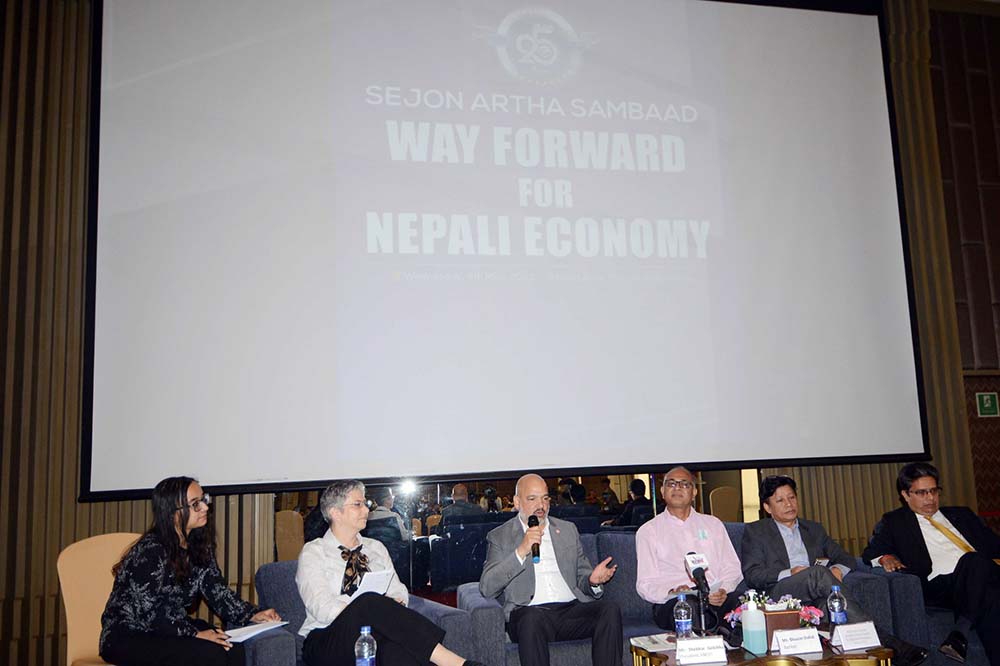
KATHMANDU: Economists participating in an economic discourse titled 'Way Forward For Nepali Economy' said the tendency to make decisions based on misgovernance and whims has led the Nepali economy towards crisis.
In the discourse organised by the Society of Economic Journalists – Nepal (SEJON) on Wednesday, they viewed that misgovernance, policy crunch, and financial opacity among other factors caused economic crisis in Sri Lanka and stressed the need for Nepal to be aware.
Addressing the discourse, Swarnim Waglé, former Vice-Chairman of National Planning Commission (NPC) and Chief Economic Advisor at the UNDP Regional Bureau for Asia and the Pacific (RBAP) in New York, said although the current situation of Nepal's economy and indicators are better than that of Sri Lanka, there is still a risk of the country going into crisis due to the tendency to make decisions based on misgovernance.
He said the research centres, statistics departments and universities, NPC as well as other financial institutions should focus on study research and coordinating roles.
Sri Lanka's current problem is debt and unpaid balance of payments deficit. "We do not have such problem. However, there are worrying signs in the economy about both debt and balance of payments deficit.
According to a recent report by the Financial Comptroller General Office (FCGO), at the time of the earthquake, public debt was only 22.5% of the total economy (GDP) in 2015. At present, Nepal's debt has crossed 40% of GDP, that is to say, the burden has increased by 17% in the last six years, Wagle asserted.
He said Nepal's current situation is similar to Sri Lanka during 1970s pointing out the debt of 40% of GDP and all external debt being bilateral or multilateral concessions.
In the discourse, Surendra Upreti, senior economic advisor at the Ministry of Finance, said the annual economic growth could be higher than the Central Bureau of Statistics (CBS)'s projection as economic activity has increased significantly in recent months. He opined that external sector may have come under pressure due to high imports that have been suspended for a long time due to Covid 19 pandemic.
Upreti claimed that the government was taking policy initiatives to improve the situation by effectively coordinating with the concerned bodies. He was of the view that economy would improve as the government's measures to reduce imports have shown signs of improvement in remittances and exports.
In the first session of the discourse, working papers were presented on "Liquidity Crunch and Financial Sector Stability" and discussed with stakeholders while the papers on "External Sector of the Economy" were presented in the second session - "External Sector of the Economy".
Economist Biswash Gauchan presented the paper in the first session and said the liquidity situation has been created since 2015. Although the banking and financial sector has expanded credit at a higher rate, it has not been able to contribute to economic growth except for the expansion of import and real estate business.
Former president of Nepal Bankers' Association (NBA), Bhuwan Dahal, who presided over the first session, said the private sector is not to blame for the current state of the economy.
Speaking at the same session, Federation of Nepali Chambers of Commerce and Industry (FNCCI) President Shekhar Golchha also claimed that the private sector is not to be blamed for the deteriorating state of the economy. The FNCCI President made this remark at a time when the private sector is accused of not focusing the investment in the productive sector.
Golchha said the regulatory body should have looked into whether the debt was heading in the right direction. However, Golchha said the private sector is ready to cooperate with the government to find solutions to the crisis.
According to NBA Vice President Sunil KC, liquidity situation will not improve even at the end of the current fiscal year. In the first nine months of the current fiscal year, banks and financial institutions have disbursed loans worth Rs 450 billion while only Rs 160 billion has been collected in deposits, he said, and added "Even with a target of 15% credit expansion for the next fiscal year, the financial sector will need around Rs 750 billion which the banks cannot provide." "For this, special initiative has to be taken from the state level."
Addressing the session, Alice John Brooks, senior economist at the World Bank Nepal, said that as the use of hydropower and biogas is increasing in Nepal, the inflation will not go to a higher level. "The state of public debt in Nepal is satisfactory compared to GDP. So, there is no need to worry about the state of the economy. But, policy decisions should be made sensitively," She said.
Similarly, former executive director of Nepal Rastra Bank Nara Bahadur Thapa presided over the second session on 'External Sector of the Economy'. Manik Lal Shrestha, former employee at International Monetary Fund (IMF), presented the working paper. He said that the problem was due to the recent increase in imports and remittances.
[caption id="attachment_23034" align="alignnone" width="1000"]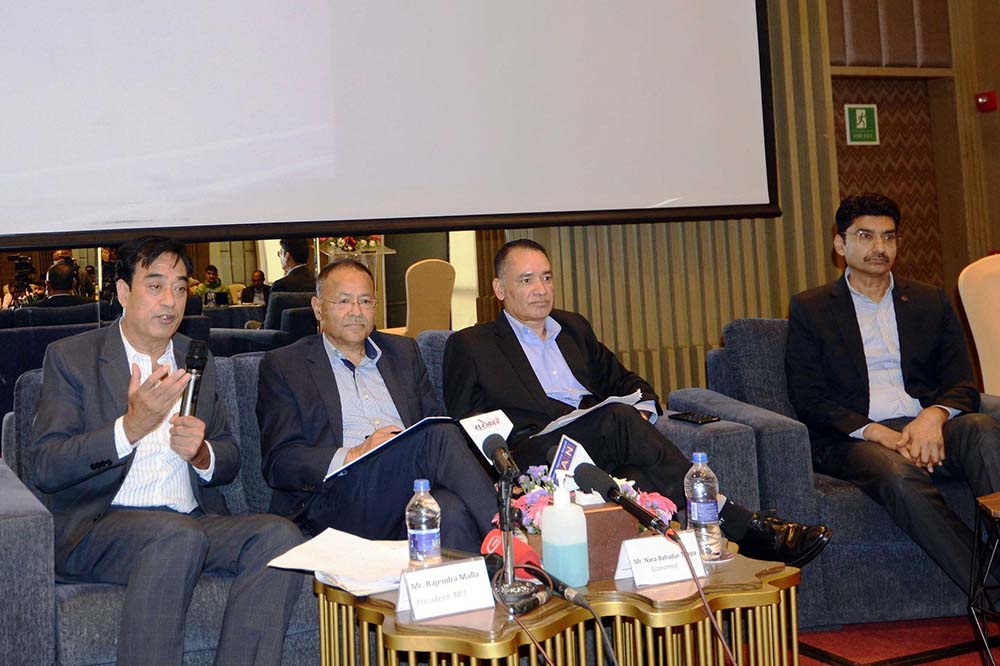 Economists and representatives of private sector's organisations participate in a discourse organised by the Society of Economic Journalists – Nepal (SEJON) in Kathmandu, on Wednesday, May 4, 2022. Photo courtesy: SEJON[/caption]
Speaking on the occasion, President of Nepal Chamber of Commerce Rajendra Malla said there is an urgent need to mechanise and diversify the agricultural sector and gave an example of Israel. He suggested not allowing the foreign exchange reserves to go below the time of six months. He also suggested the government should bring a policy to promote export.
"India had also a liquidity crisis in 1991-1992 like Nepal. India turned that crisis into an opportunity in a sensible way," said Vishnu Agarwal, President of the Confederation of Nepalese Industries. He called for adopting industrialisation saying that there was no alternative to it.
Speaking on the occasion, SEJON President Janardan Baral said that economic discourse was organised to hold discussions among various stakeholders and economists to make the general public aware of the present economic situation. He also said that the discussions and suggestions in the discourse will be forwarded to the policymakers.
Economists and representatives of private sector's organisations participate in a discourse organised by the Society of Economic Journalists – Nepal (SEJON) in Kathmandu, on Wednesday, May 4, 2022. Photo courtesy: SEJON[/caption]
Speaking on the occasion, President of Nepal Chamber of Commerce Rajendra Malla said there is an urgent need to mechanise and diversify the agricultural sector and gave an example of Israel. He suggested not allowing the foreign exchange reserves to go below the time of six months. He also suggested the government should bring a policy to promote export.
"India had also a liquidity crisis in 1991-1992 like Nepal. India turned that crisis into an opportunity in a sensible way," said Vishnu Agarwal, President of the Confederation of Nepalese Industries. He called for adopting industrialisation saying that there was no alternative to it.
Speaking on the occasion, SEJON President Janardan Baral said that economic discourse was organised to hold discussions among various stakeholders and economists to make the general public aware of the present economic situation. He also said that the discussions and suggestions in the discourse will be forwarded to the policymakers.
 Economists and representatives of private sector's organisations participate in a discourse organised by the Society of Economic Journalists – Nepal (SEJON) in Kathmandu, on Wednesday, May 4, 2022. Photo courtesy: SEJON[/caption]
Speaking on the occasion, President of Nepal Chamber of Commerce Rajendra Malla said there is an urgent need to mechanise and diversify the agricultural sector and gave an example of Israel. He suggested not allowing the foreign exchange reserves to go below the time of six months. He also suggested the government should bring a policy to promote export.
"India had also a liquidity crisis in 1991-1992 like Nepal. India turned that crisis into an opportunity in a sensible way," said Vishnu Agarwal, President of the Confederation of Nepalese Industries. He called for adopting industrialisation saying that there was no alternative to it.
Speaking on the occasion, SEJON President Janardan Baral said that economic discourse was organised to hold discussions among various stakeholders and economists to make the general public aware of the present economic situation. He also said that the discussions and suggestions in the discourse will be forwarded to the policymakers.
Economists and representatives of private sector's organisations participate in a discourse organised by the Society of Economic Journalists – Nepal (SEJON) in Kathmandu, on Wednesday, May 4, 2022. Photo courtesy: SEJON[/caption]
Speaking on the occasion, President of Nepal Chamber of Commerce Rajendra Malla said there is an urgent need to mechanise and diversify the agricultural sector and gave an example of Israel. He suggested not allowing the foreign exchange reserves to go below the time of six months. He also suggested the government should bring a policy to promote export.
"India had also a liquidity crisis in 1991-1992 like Nepal. India turned that crisis into an opportunity in a sensible way," said Vishnu Agarwal, President of the Confederation of Nepalese Industries. He called for adopting industrialisation saying that there was no alternative to it.
Speaking on the occasion, SEJON President Janardan Baral said that economic discourse was organised to hold discussions among various stakeholders and economists to make the general public aware of the present economic situation. He also said that the discussions and suggestions in the discourse will be forwarded to the policymakers.
Published Date: May 5, 2022, 12:00 am
Post Comment
E-Magazine
RELATED B360 National


